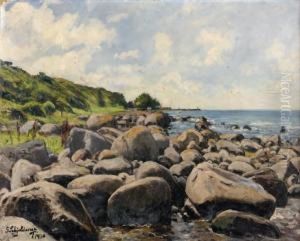Georg Schjelderup Paintings
Georg Andreas Bull Schjelderup was a Norwegian composer, conductor, and music critic born on June 24, 1859, in Kristiania, now Oslo, Norway. He was part of the late Romantic period in music, contributing significantly to the cultural scene of his time. Schjelderup's musical journey began at an early age, showing a profound interest in composition and performance. His talent and dedication led him to pursue further education in music, studying under prominent figures of the time in Germany, a common practice for many Scandinavian artists seeking to refine their skills among the European elite.
Schjelderup's compositions include a variety of genres, from operas and symphonic works to chamber music and songs. His style, heavily influenced by the German Romantic tradition, also incorporated elements of Norwegian folk music, aligning him with the nationalist movement in music that was prevalent in Scandinavia during the late 19th and early 20th centuries. This blend of influences allowed Schjelderup to create works that were both universal in their appeal and distinctly Norwegian in character.
Throughout his career, Schjelderup also engaged in conducting and music criticism. As a conductor, he was known for his interpretations of both contemporary and classical repertoire, contributing to the musical life of Norway by introducing audiences to a broad spectrum of works. His writings on music, which appeared in various periodicals and newspapers, reflected his deep understanding of musical art and his advocacy for the recognition of Norwegian music both domestically and abroad.
Georg Schjelderup's contributions to Norwegian music were recognized in his time, and his legacy continues to be celebrated for enriching the cultural heritage of Norway. He passed away on May 1, 1934, in Oslo, leaving behind a body of work that continues to be studied and performed, highlighting his role in the development of Norwegian music during a pivotal period in its history.
